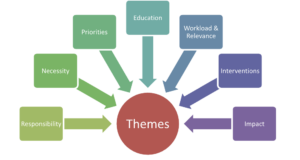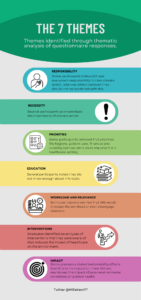Keywords: Physiotherapy education, sustainable healthcare, barriers to change.
Introduction
Sustainable health education (SHE) in physiotherapy is emerging, with eighty-five education institutions currently incorporating an element of it in their physiotherapy curriculums globally [1]. This blog will outline a recent undergraduate study into the opinions of physiotherapy students and graduates from the University of Nottingham (UoN) on SHE, available here.
Why is this study important?
Climate change is the single biggest health threat facing humanity, yet paradoxically, healthcare is responsible for 5% of carbon emissions in the UK [4]. Research shows that healthcare professionals (HCPs) lack knowledge of the relationship between planetary and human health, and understanding this relationship can lead to positive changes in clinicians’ practices, policies, and patient care [3, 5, 6]. To tackle this, the field of environmental physiotherapy has been developed [7, 8, 9, 10] and some universities have started to incorporate SHE into their physiotherapy curriculums [1]. The University of Nottingham is planning to do this in its recently accredited programme, by beginning modules such as “Health in Society”, “Population Health and Wellbeing” and “Sustainable Health”. This study explored the opinions of students and graduates on this idea and identified barriers to change. By addressing these barriers, the university can optimise the chances of engagement with SHE in the future [2].

Figure 1 Picture by Greg Rosenke
What did we do?
This study designed, piloted, and shared an online study to gain knowledge of student and graduate opinions on the topic outlined. 34 students and 11 graduates responded to the questionnaire. Results were then analysed descriptively, using statistics and frequencies to describe quantitative data and thematic coding to share qualitative data. All types of data were used to identify barriers to the implementation of SHE into the curriculum.
What did the study find?
- Twenty-eight (62%) of participants believed sustainability topics should be incorporated into physiotherapy education. The remaining seventeen (38%) believed this should not happen.
- Thirty participants had positive initial reactions to SHE (interested, excited, pleased, relieved), five had negative reactions (boring, frazzled, not interested, neutral), and eighteen mentioned being confused by the concept. This demonstrates the need for further explanation.
- Seven themes were identified from open text responses, as shown in figure 2.

Figure 2. Themes Identified
Responsibility – Some participants believed it was everyone’s responsibility to take climate action, whereas others believed that HCPs should not be burdened with this.
Necessity – Several participants acknowledged the importance of climate action.
Priorities – Some participants believed that priorities like hygiene, patient care, finances and avoiding burnout were more important in a healthcare setting.
Education – Several participants noted they did not know enough about this topic.
Workload and relevance – Some participants worried that SHE would increase the workload or even disengage students.
Interventions – Graduates identified seven types of interventions that they were aware of that reduced the impact of healthcare on the environment.
Impact – Some graduates stated sustainability efforts had little to no impact on them. Others explained that they had seen patients whose health had been worsened by poor environmental conditions.
Three main barriers to implementation were identified
(1) Belief that planetary health is not relevant to clinical practice.
(2) Belief that there are bigger priorities to learn about in healthcare.
(3) Concern that it would increase the workload for students.
Conclusion
This blog has summarised the results of a recent study into opinions of SHE. For ideas on what the next steps could be, please see the following blog.

Author
Millie Kent, Physiotherapist, University of Nottingham graduate, Twitter @MillieKentPT.
Acknowledgements
Ann Gates, Honorary Associate Professor University of Nottingham.
Fiona Moffatt, Associate Professor University of Nottingham.
Filip Maric, Associate Professor, UiT the Artic University of Norway.
Roger Kerry, Professor of Physiotherapy Education University of Nottingham.
Competing Interests
No competing interests.
References
- EPT Agenda 2023. (n.d.). EPT Agenda 2023 | Participating Institutions. Available online: https://eptagenda2023.com/participating-institutions [Accessed 17/08/2023].
- Fagiewicz K, Churski P, Herodowicz T, Kaczmarek P, Lupa P, Morawska-Jancelewicz J, & Mizgajski A. (2021). Cocreation for Climate Change—Needs for Actions to Vitalize Drivers and Diminish Barriers. Weather, Climate, and Society, 13(3), 555–570. https://doi.org/10.1175/WCAS-D-20-0114.1
- Hathaway J, & Maibach EW. (2018). Health Implications of Climate Change: A Review of the Literature About the Perception of the Public and Health Professionals. Current Environmental Health Reports, 5(1), 197–204. https://doi.org/10.1007/S40572-018-0190-3/METRICS
- Karliner J, Slotterback S, Boyd R, Ashby B, & Steele K. (2019). HEALTH CARE’S CLIMATE FOOTPRINT Health Care Without Harm and ARUP. Available online: https://www.arup.com/perspectives/publications/research/section/healthcares-climate-footprint [Accessed 30.04.23].
- Kotcher J, Maibach E, Miller J, Campbell E, Alqodmani L, Maiero M, & Wyns A. (2021). Views of health professionals on climate change and health: a multinational survey study. In The Lancet Planetary Health (Vol. 5, Issue 5, pp. e316–e323). https://doi.org/10.1016/S2542-5196(21)00053-X
- Lister HE, Mostert K, Botha T, Van der Linde S, van Wyk E, Rocher SA, Laing R, Wu L, Müller S, des Tombe A, Kganyago T, Zwane N, Mphogo B, & Maric F. (2022). South African Healthcare Professionals’ Knowledge, Attitudes, and Practices Regarding Environmental Sustainability in Healthcare: A Mixed-Methods Study. International Journal of Environmental Research and Public Health, 19(16). https://doi.org/10.3390/ijerph191610121
- Maric F, & Nicholls D. (2019). A call for a new environmental physiotherapy – An editorial. In Physiotherapy Theory and Practice (Vol. 35, Issue 10, pp. 905–907). Taylor and Francis Ltd. https://doi.org/10.1080/09593985.2019.1632006
- Padhy, G., & Raj, J. (2021). Environmental Physiotherapy and Global Issues. International Journal of Innovative Science and Research Technology, 6(10). https://doi.org/10.1080/09593985.2019.1632006
- Palstam, A., Andersson, M., Lange, E., & Grenholm, A. (2021). A Call to Include a Perspective of Sustainable Development in Physical Therapy Research. Physical Therapy, 101(3), 1–4. https://doi.org/10.1093/PTJ/PZAA228
- Palstam, A., Sehdev, S., Barna, S., Andersson, M., & Liebenberg, N. (2022). Sustainability in physiotherapy and rehabilitation.